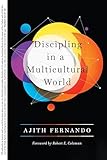The challenge of cross-cultural discipleship belongs not only to missionaries but to all who call themselves Christians. Between globalization, immigration, refugee crises, generation gaps, the rise of the religiously unaffiliated, and many other cultural shifts, the world in which we live and minister is a multicultural one, whether we reside in Quito, Ecuador, or Quitaque, Texas.
Ajith Fernando’s Discipling in a Multicultural World is by no means the final word on discipleship, cross-cultural or otherwise. Nevertheless, the Sri Lankan church leader provides principles that are both biblically sound and readily applicable in any corner of our increasingly multicultural world.
For Fernando, discipling is parenting. Citing such examples as Paul and Timothy, Peter and Mark, Martin Luther, and Charles Spurgeon, Fernando leans heavily into the biblical notion of shepherding for the theological foundation of “spiritual parenthood.” He casts a vision of long-term and highly relational ministry in which disciplers assume indefinite responsibility for their disciplees’ spiritual growth.
But while this metaphor of “spiritual parenthood” forms the core of Fernando’s philosophy of discipleship, it does not constitute the whole. “Discipling,” he adds, “is individual; but it is not individualistic.” This one-to-one process occurs in the general context of a small discipleship group, which is itself intimately grafted into a local church and ultimately loyal to the universal body of Christ. Like earthly parents, spiritual parents take primary responsibility for their children’s growth, but they realize that this growth requires relationships and insights beyond what they alone can offer.
Fernando takes for granted that the goal of discipleship is transformation, to “present everyone fully mature in Christ” (Col. 1:28–29). Accordingly, the second half of his book, titled “How Christians Change,” covers everything from personal evangelism to study habits. This is a welcome antidote to the semantically fraught debate in discipleship-training circles that pits a knowledge-based approach against an obedience-based discipleship. The Word of God (along with the work of the Spirit and the fellowship of believers) is the means by which Christians change, and obedience to God is evidence of that change. To hold the two in opposition is to misunderstand both the process and the purpose of discipleship.
Recognizing the cultural diversity and fluidity of the contemporary world, Fernando attempts, in his words, “to be alert to this challenge” as he outlines his philosophy of discipleship. However, because he is so careful to describe postures rather than prescribe gestures (to borrow terms from Andy Crouch’s Culture Making), he arrives at a set of insights versatile enough to apply far beyond cross-cultural discipleship alone. Discipling in a Multicultural World certainly contains advice for those crossing cultural lines with the gospel, but more importantly, it exemplifies a posture of cultural sensitivity that would not be out of place in any discipling relationship.
One of the key categories of transformation Fernando describes is “evaluative transformation,” which involves evaluating the beliefs and practices of the prevailing culture. He emphasizes the need to discard those facets of culture that run counter to Scripture, giving numerous examples of how this can be taught and practiced. (One example concerns the cultural norms of lying and vengeance in his native Sri Lanka.) As much as possible, however, Fernando advocates working “with” culture, both affirming all that resonates with biblical orthodoxy and exploring how different cultures shed unique light on the gospel.
In three chapters exploring the moral dynamics of guilt and forgiveness, honor and shame, and power and fear, Fernando offers guidance for teaching the biblical concepts of guilt and forgiveness to believers living in cultures with strong honor-and-shame or power-and-fear dynamics. Additionally, though, he shows how these dynamics are themselves expressed in Scripture—and how disciplers can frame their teaching and conversation in ways that affirm their validity.
Overall, the posture Fernando advocates and exemplifies is one of allegiance to Scripture and respect for culture. As such, his example is a fine one for any cross-cultural worker seeking to avoid imposing narrowly Western ways of thinking and living, but it is also ideal for Western believers in ostensibly “Christian” cultures. In both cases, culture is an inescapable facet of life and sanctification, and well-discipled believers must be equipped to respond biblically and redemptively to every culture they encounter.
Jaclyn S. Parrish is a writer, editor, and social media associate for the International Mission Board.











